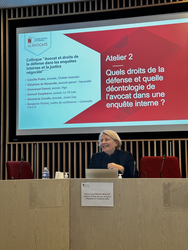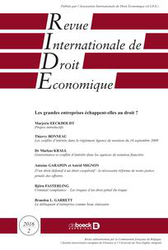Thesaurus : Doctrine

► Référence complète : S-M.. Cabon, "Théorie et pratique de la négociation dans la justice pénale", in M.-A. Frison-Roche & M. Boissavy (dir.), Compliance et Droits de la défense - Enquête interne, CIIP, CRPC, Journal of Regulation & Compliance (JoRC) et Dalloz, coll. "Régulations & Compliance", à paraître.
____
📕consulter une présentation générale de l'ouvrage, Compliance et Droits de la défense - Enquête interne, CIIP, CRPC, dans lequel cet article est publié
____
► Résumé de l'article (fait par le Journal of Regulation & Compliance - JoRC) : L'auteure définit la technique de "négociation" comme celle par laquelle "chaque interlocuteur va tenter de rendre compatibles par un jeu de coopération et de concessions mutuelles", ce qui va donc être utilisé dans la justice pénale française non pas tant par attraction du modèle américain, mais pour tenter de résoudre les difficultés engendrées par le flux des contentieux, le procédé s'étant élargi aux contentieux répressif, notamment devant les autorités administratives de régulation. Le principe en est donc la coopération du délinquant.
L'auteur souligne les satisfactions "pratiques" revendiqués, puisque les cas sont résolus, les sanctions sont acceptées, et les inquiétudes "théoriques", puisque des principes fondamentaux semblent écartés, comme les droits de la défense, l'affirmation étant faite comme quoi les avantages pratiques et le fait que rien n'oblige les entreprises à accepter les CJIP et les CRPC justifient que l'on ne s'arrête pas à ces considérations "théoriques".
L'article est donc construit sur la confrontation de "l'Utile" et du "Juste", parce que c'est ainsi que le système est présenté, l'utilité et le consentement étant notamment mis en valeur dans les lignes directrices des autorités publiques.
Face à cela, l'auteur examine la façon dont les textes continuent, ou pas, de protéger la personne qui risque d'être in fine sanctionnée, notamment dans les enquêtes et investigations, le fait qu'elle consente à renoncer à cette protection, notamment qu'elle apporte elle-même les éléments probatoires de ce qui sera la base de sa déclaration de culpabilité tandis que l'Autorité publique ne renonce pas encore au même moment à la poursuite étant problématique au regard du "Juste".
La seconde partie de l'article est donc consacrée à "l'Utile contraint à être Juste". A ce titre, l'auteur pense que l'indépendance du ministère public devrait être plus forte, à l'image de ce qu'est le Parquet européen, et le contrôle du juge judiciaire plus profond car la procédure actuelle de validation des CJIP semble régie par le principe dispositif, principe qui ne sied pas à la justice pénale.
________
Oct. 6, 2023
Conferences

♾️follow Marie-Anne Frison-Roche on LinkedIn
♾️subscribe to the Newsletter MAFR Regulation, Compliance, Law
____
► Full Reference: M.-A. Frison-Roche, "La rencontre des MARD/PRD avec les Buts Monumentaux de la Compliance" ("The meeting of the alternative dispute resolution mechanisms with Compliance Monumental Goals"), in A. Albarian, S. Brunengo, D. Labrèche et N. Vermeys (dir.), Regards croisés France/Québec: l'essor et l'adaptation des PRD/MARD dans un contexte de crise, Aix-Marseille University, 6 and 7 October 2023.
____
🧮see the full programme of this event
________
April 20, 2023
Conferences

♾️ suivre Marie-Anne Frison-Roche sur LinkedIn
♾️s'abonner à la Newsletter MAFR Regulation, Compliance, Law
____
► Référence complète : M.-A. Frison-Roche, synthèses de chacune des 8 tables-rondes et synthèse finale, in Conseil National des Barreaux (CNB), L'avocat et les droits de la défense dans les enquêtes internes et la justice négociée, Paris, 20 et 21 avril 2023.
____
🧮Consulter le programme complet de cette manifestation
🧮Retrouver le programme dans lequel les vidéos sont insérées
📕Consulter une première présentation de l'ouvrage dirigé par Marie-Anne Frison-Roche et Matthieu Boissavy.
____
Dans la journée du 20 avril 2023
consacrée plus particulièrement aux enquêtes internes
🎥regarder le film de la première session, ayant pour thème : Des avocats dans les enquêtes internes : pourquoi, avec qui et avec quels outils ? cliquer ICI
____
🎥regarder le film de la deuxième session, ayant pour thème : Quels droits de la défense et quelle déontologie de l'avocat dans une enquête interne ? cliquer ICI
____
🎥regarder le film de la troisième session, ayant pour thème : Les enquêtes internes en matière sociale : cliquer ICI
____
🎥regarder le film de la quatrième session, ayant pour thème : Les enquêtes internes dans la lutte anti-corruption et pour le respect du devoir de vigilance : cliquer ICI (la synthèse porta à la fois sur cette 4ième session et sur l'ensemble de la journée)
________
Dans la journée du 21 avril 2023
consacrée plus particulièrement à la CJIP et à la CRPC
🎥regarder le film de la première session, ayant pour thème : Théorie et pratique de la négociation dans la justice pénale cliquer ICI
____
🎥regarder le film de la deuxième session, ayant pour thème : Le rôle du juge, du procureur, du justiciable et de l'avocat dans une CRPC et une CJIP cliquer ICI
____
🎥regarder le film de la troisième session, ayant pour thème : Combinaison des CRPC et des CJIP : enjeux, défis et perspectives cliquer ICI
____
🎥regarder le film de la quatrième session, ayant pour thème : Analyse comparative internationale de la justice négociée et prospective cliquer ICI
____
🎥regarder le film de la troisième session, ayant pour thème : Combinaison des CRPC et des CJIP : enjeux, défis et perspectives cliquer ICI
____
Feb. 2, 2023
Thesaurus : Doctrine

► Full Reference: A. Bavitot, "Le façonnage de l'entreprise par les accords de justice pénale négociée" ("Shaping the company through negotiated Criminal Justice Agreements"), in M.-A. Frison-Roche (ed.), La juridictionnalisation de la Compliance, coll. "Régulations & Compliance", Journal of Regulation & Compliance (JoRC) and Dalloz, 2023, p. 187-198.
____
📕read a general presentation of the book, La juridictionnalisation de la Compliance, in which this article is published
____
► Summary of the article (done by the author): Negotiated justice is "the situation in which the criminal conflict is the object of a trade in the etymological sense of the term negotio, i.e. a debate between the parties to reach an agreement".
Thus, the French legislator has succumbed to globalized mimicry by creating the Convention judiciaire d'intérêt public (Public Interest Judicial Agreement), first in matters of probity and then in environmental matters. What is the nature of this deal of justice? Validated by a judge's order, it does not entail any declaration of guilt, has neither the nature nor the effects of a judgment of conviction and is not registered in the judicial record. Possible at the investigation stage as well as at the pre-trial stage, the Public Interest Judicial Agreement is original in that it makes it possible to avoid either the prosecutor's proceedings or the judge's wrath.
A detailed study of the agreements signed shows that in order to negotiate in the best possible way, the company can and must shape itself. The company will shape the facts of its agreement, shape its charge and, finally, shape its sentence. The article offers a concrete analysis of these three dimensions of corporate shaping to better approach understanding the legal nature of negotiated criminal justice agreements.
________
June 17, 2021
Compliance: at the moment

► Compliance Law and Competition: for building, is it necessary to legislate ? Example of quasi-public interest judicial agreement: the French Competition Authority's Statement of June 3, 2021 on Facebook
The French law so-called "Sapin 2" of 2016, organized the "convention judiciaire d’intérêt public - CJIP" (Public Interest Judicial Agreement) which allows the prosecutor to undertake not to prosecute a company in returns for this company's commitments for the future. Is this mechanism reserved for this law, which only concerns corruption and bribery? The answer is often positive.
Is it so obvious?
Since the entity having the power to prosecute therefore always has the power not to prosecute. As the company always has the freedom to make commitments for the future. And everything stops.
News in Competition Law illustrate this. On June 9, 2021, as part of a transaction, the Autorité de la concurrence (French Competition Authority) sanctions Google (➡️📝 Communiqué of the Autorité de la Concurrence , translated in English by the French Competition Authority) , which has not contested the facts, for abuse of dominant position for having privileged its services in the online advertising services. Similar facts were alleged against Facebook. But on June 3, 2021, the Autorité de la concurrence (French Competition Authority) published a "communiqué de presse" (➡️📝statement translated in English by the French Competition Authority) saying that Facebook has, during the investigation, proposed commitments regarding its future behavior. It is remarkable that this statement on Facebook is published as an “acte de régulation” (regulatory act).
Yes, it is indeed an regulatory act about the future and structuring the online advertising area, internalized in this company which engages itself in its future behavior. With its statement, the Competition Authority invites the “acteurs du secteur” (actors of this sector) to make observations, for the development of what will be a sort of compliance program.
In these negotiations which are akin to a game table, where everyone calculates without knowing if they enter into a negotiation or a confrontation, the first game assuming that one shows more cards than in the second, it is indeed towards a kind of Public Interest Judicial Agreement that they are going with a Competition Authority which is both Judge and Prosecutor, concludes the agreement and, through a later decision, gives it force. Under the various legal qualifications, it is indeed the same general mechanism of Compliance Law, well beyond the specific French law known as Sapin 2.
Managed in this way, Compliance Law being an Ex Ante corpus, transforms the Competition Authority, an Ex Post Authority, into an Ex Ante Authority, openly taking "acte de régulation" (Regulatory Act), and allows it to rely on the power of companies, thus “committed”, to structure markets, which are however not regulated. Like advertising or retailing areas (➡️📝see Frison-Roche, M.-A., From Competition Law to Compliance Law: Example of French Competition Authority's decision on central purchasing body in mass distribution, 2020).
Thus Compliance Law has achieved the autonomy of Regulatory Law with regards to the notion, which nevertheless seemed intimate to it, of "sector".
June 16, 2016
Thesaurus : Doctrine

Référence complète : Eeckhoudt, M. (dir.), Les grandes entreprises échappent-elles au droit, Revue Internationale de Droit Économique (RIDE), 2016/2,De Boeck, (introduction, par Marjorie Eeckhoudt, p. 151-163.).
Les étudiants de Sciences po peuvent lire l'article via le drive dans le dossier "MAFR - Régulation" les différents articles qui constituent le dossier.
L'auteur présente dans l'introduction le dossier consacré à l'articulation entre la compliance et la responsabilité pénale.
Elle y voit l'importation du droit américain dans un "copier-traduire-coller". Elle y voit à la fois la puissance du droit et un moyen pour les grandes entreprises qui multiplient les chartes d'échapper aux droits nationaux.
Elle estime que cela participe des "divers instruments de la régulation", assistant notamment à un retour de la réglementation, par exemple à propos des agences de notation et la règle comply or explain.
Or, "compliance rime avec indépendance" (p.158) et l'agence de notation n'est pas toujours indépendance de son client : c'est pourquoi le conflit d'intérêts est au cœur de la compliance. "compliance rime avec transparence" (p.158).
L'auteur explique le souci d'efficacité guide aussi désormais la responsabilité pénale, à travers la négociation pénale ou l'accueil du lanceur d'alerte. Mais l'efficacité n'est encore la mieux servie en matière de sanction.
Dans ce dossier voir aussi :
BONNEAU Thierry, Les conflits d'intérêts dans le règlement Agence de notation du 16 septembre 2009.
KRALL Markus, Gouvernance et conflits d'intérêts dans les agences de notation financière.
FASTERLING Björn, Criminal compliance - Les risques d'un droit pénal du risque.
GARRETT Brandon L., Le délinquant d'entreprise comme bouc émissaire.
_____
Updated: July 31, 2013 (Initial publication: Nov. 28, 2011)
Teachings : Les Grandes Questions du Droit, semestre d'automne 2011

Nov. 6, 1996
Thesaurus : Doctrine
Référence : FRYDMAN, Benoît, Négociation ou marchandage ? De l'éthique de la discussion au droit de la négociation, in GERARD, Philippe, OST, François, VAN DE KERCHOVE, Michel (dir.), droit négocié, droit imposé ?, Publications des facultés universitaires Saint-Louis, Bruxelles, 1996, p.231-252.
L'article est consacré aux théories de la négociation.
L'auteur expose tout d'abord les philosophies de la négociation, c'est-à-dire celle du marché où la négociation a été mise en valeur par l'analyse économique du droit, puis celle de John Rawls à travers la théorie du voile d'ignorance, enfin celle de Jürgen Habermas à travers l'éthique de la discussion.
La seconde partie de l'article s'appuie sur ces travaux d'une part et le droit positif d'autre part (belge, en l'espèce) pour montrer que tout semble se négocier, non seulement en droit des contrats, sphère naturelle mais au-delà de celui-ci. Ainsi, les normes se négocient.
Désormais, le "droit négocié" est un phénomène social général et il convient, selon l'auteur, d'élaborer en conséquence, un "droit général de la négociation" (p.250 s.)
Ce droit de la négociation ne serait pas simplement procédural mais viserait à "définir un mode équilibré de discussion", le sujet étant considéré in concreto dans son cercle de communication intersubjective, le principe de respect des anticipations légitimes des autres devant être posé. En outre, devant être posé "un véritable droit d'accès de tous à la négociation".
______